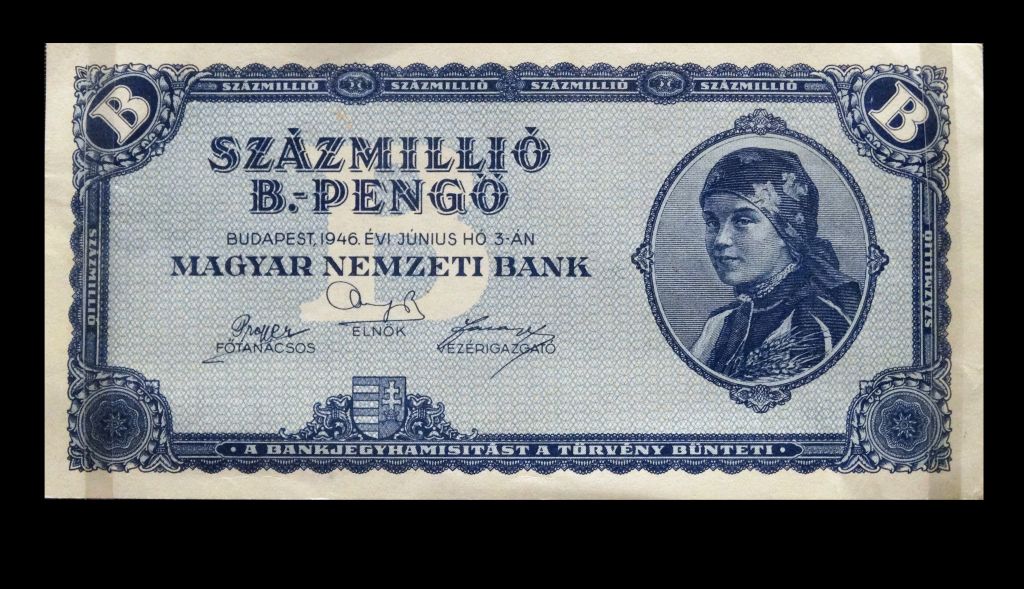10 July 1946: Hungary suffers the world’s worst hyperinflation
The highest level of inflation ever recorded occurred in Hungary in July 1946. Prices were rising at 350% a day.


Get the latest financial news, insights and expert analysis from our award-winning MoneyWeek team, to help you understand what really matters when it comes to your finances.
You are now subscribed
Your newsletter sign-up was successful
Want to add more newsletters?

Twice daily
MoneyWeek
Get the latest financial news, insights and expert analysis from our award-winning MoneyWeek team, to help you understand what really matters when it comes to your finances.

Four times a week
Look After My Bills
Sign up to our free money-saving newsletter, filled with the latest news and expert advice to help you find the best tips and deals for managing your bills. Start saving today!
Hungarians haven't had a happy time with their currencies. Since 2008, the forint has fallen 37% against the dollar, due in large part to the eurozone crisis, although political instability hasn't helped.
In fact, the forint is the country's third currency in less than a century. And to this day, Hungary holds the unhappy record of suffering the highest rate of inflation ever recorded.
Hungary's first currency was created after the break-up of the Austro-Hungarian Empire at the end of the First World War. Under the terms of the Treaty of Saint-Germain in 1919, the newly independent Hungary adopted the korona. Inflation started to spiral out of control, and in 1925, it was decided to scrap the korona for the peng.
MoneyWeek
Subscribe to MoneyWeek today and get your first six magazine issues absolutely FREE

Sign up to Money Morning
Don't miss the latest investment and personal finances news, market analysis, plus money-saving tips with our free twice-daily newsletter
Don't miss the latest investment and personal finances news, market analysis, plus money-saving tips with our free twice-daily newsletter
For the first few years, things went well for the peng. Pegged to gold, it was one of the most stable currencies in the world. But in the 1930s, the Great Depression arrived and the currency was devalued.
Then came the Vienna Awards. Championed by Adolf Hitler and Benito Mussolini, Hungary was given back land it had lost in the aftermath of World War One. These territories were less developed and came at a cost to the economy.
Hungary at this point was little more than a puppet state of Nazi Germany. As a result, it entered the Second World War against the Allies. When the war started to go badly, and the Red Army was bearing down on its borders, the fascist government of Ferenc Szlasi took control of the printing presses.
Massive money printing continued after Hungary fell to the Soviets, which led to hyperinflation, reaching its peak on 10 July 1946. Prices were rising at just under 350% a day, and the peng had long since become all but worthless.
In August that year, the government took drastic action - it ditched the peng. The forint was introduced at a rate of one forint for every 400,000 quadrillion peng (that's 29 zeros).
Hungary joined the European Union in 2004. But as part of its accession, it agreed to one day adopt the euro - a currency with a troubled history of its own.
Get the latest financial news, insights and expert analysis from our award-winning MoneyWeek team, to help you understand what really matters when it comes to your finances.

-
 Should you buy an active ETF?
Should you buy an active ETF?ETFs are often mischaracterised as passive products, but they can be a convenient way to add active management to your portfolio
-
 Power up your pension before 5 April – easy ways to save before the tax year end
Power up your pension before 5 April – easy ways to save before the tax year endWith the end of the tax year looming, pension savers currently have a window to review and maximise what’s going into their retirement funds – we look at how